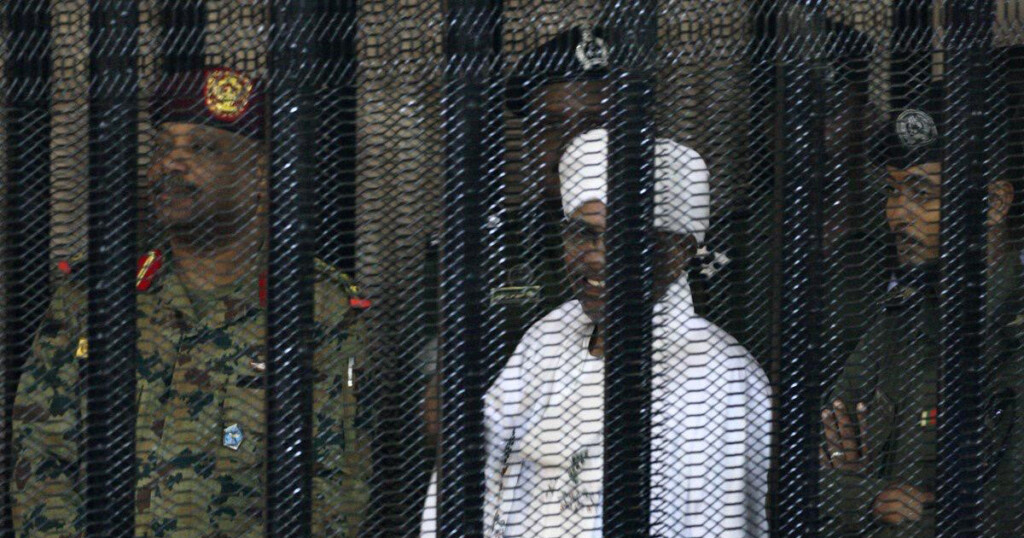Sudanese army confirms Al Bashir being treated at military hospital

Ousted President Omar Al Bashir in court in August, 2019 (Social media)
KHARTOUM –
Former President Omar Al Bashir and other officials from his regime are being held under police guard at a military hospital, the Sudanese army announced on Thursday. The announcement followed reports about several prominent Islamists escaped from Kober Prison in Khartoum North.
The Sudan Armed Forces (SAF) said in a press statement on Thursday that ousted President Omar Al Bashir and other figures from his regime are being treated at the military Aliaa Specialist Hospital due to health conditions.
They were receiving medical treatment prior to the outbreak of fierce fighting between the SAF and the paramilitary Rapid Support Forces (RSF), which the army describes as a “rebels”. In addition to Al Bashir, Bakri Hasan Salih, Abdelrahim Hussein, Ahmed Tayeb El Khanjar and Yousef Abdelfattah are receiving medical care under the guard of the police.
“The army clarifies its position to prevent misinformation and accusations being spread by media representatives of the rebels,” the statement explained.
A source from Al Bashir’s family confirmed that the former president and several other regime figures were receiving medical care at the military hospital in Omdurman before the start of the recent conflict, due to chronic illnesses.
The SAF statement came amid ongoing mutual accusations following reports that former regime leaders escaped from Kober Prison during the fighting that began 14 days ago.
Conflicting accusations
The escape of several Al Bashir regime leaders, including the former vice president Ali Osman Taha, and former ministers Ahmed Harun and Awad El Jaz, from Kober Prison has sparked controversy and mutual accusations regarding responsibility.
After Harun published an audio recording explaining the circumstances of their escape and calling for support for the SAF, the army denied in a statement any involvement in the escape. The RSF, in turn, accused the Sudanese army’s military intelligence of coordinating the release of regime figures with the Islamists.
The Sudanese Ministry of Interior accused the RSF of storming five prisons and releasing inmates between April 21 and 24.
Ahmed Harun, Ali Osman Taha, Awad El Jaz, and Nafi Ali Nafi, known as Islamist hardliners (referred to as kezan* in Sudanese slang), have all served as ministers during the Al Bashir regime. Taha was appointed as vice president in 1995 and again in 2005.
Charged
Harun, Al Bashir, and Hussein have been indicted by the International Criminal Court (ICC) in The Hague for crimes committed during the war fought in the Darfur region since 2003, which has claimed more than 300,000 lives.
During negotiations with the armed rebel movements in Juba in February 2020, the Sudanese government agreed to extradite Al Bashir and his aides to the ICC. In mid June, however, Sudan’s Attorney General Tajelsir El Hibir said that Al Bashir and the other ICC suspects might not necessarily stand trial in The Hague, but can face justice in Sudan instead.
In December 2019, Al Bashir was convicted on charges of corruption. He was sentenced to two years in a ‘correctional facility’ for elderly prisoners.
In the same month, the Sudanese Public Prosecution opened an investigation into crimes committed in Darfur since 2003.
The dictator has also been charged with involvement in the killing of demonstrators during the protests that led to his removal from power.
The trial of Al Bashir and 27 other former officials for their part in the 1989 military coup that brought them to power, began in July 2020. In December last year, Al Bashir acknowledged he was responsible for the June 30, 1989 coup.
* Kezan, or kizan, is a pejorative nickname used by many Sudanese to refer to Islamist loyalists to the regime of Omar Al Bashir (1989-2019) and who enjoyed far-fetching privileges during his rule. The word is the plural of koz which means ‘wooden or iron mug’. The nickname is based on a description the Islamic Brotherhood called themselves, when the founder of the group, the Egyptian Hasan El Banna, said “Religion is a sea, and we are the mugs that draw from it”.











 and then
and then